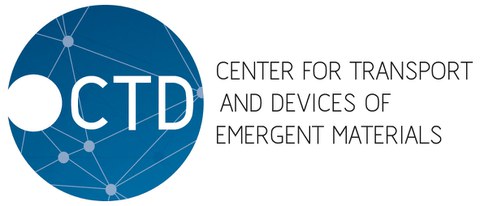Center for Transport and Devices
Das Center for Transport and Devices of Emergent Materials (CTD) an der TU Dresden verknüpft fakultätsübergreifend Forschungsschwerpunkte in den Bereichen der Materialforschung und der elektronischen Bauelemente.
Die elektronischen Eigenschaften von neuartigen Materialien – „Emergent Materials“ – werden dabei im Hinblick auf neue physikalische Phänomene und speziell auf ihr Potential für zukünftige elektronische Anwendungen erforscht. Konkrete Beispiele für „Emergent Materials“ sind topologische Isolatoren, frustrierte Magnete und andere stark korrelierte Elektronensysteme, hybride Materialien (z.B. mesoskopische Halbleiter-Supraleiter-Heterostrukturen, oxidische Heterostrukturen), Graphen und andere niederdimensionale Systeme, molekulare Nanostrukturen, komplexe organische oder metallorganische Verbindungen, sowie ferromagnetische Halbmetalle.
Im CTD werden „Emergent Materials“ gezielt in Form oder als Bestandteil von Devices, d.h. nanoskaligen elektronischen Bauelementen, hergestellt, experimentell untersucht und theoretisch modelliert. Das erlaubt zunächst das Studium von fundamentalen Materialeigenschaften, insbesondere von Transportphänomenen wie z.B. Quanteninterferenzen, ballistischem Transport, Spindephasierung, Spininjektion, Grenz- und Oberflächentransport etc. Zudem wird damit gezielt eine interdisziplinäre Brücke geschlagen zwischen Grundlagenforschung, hier der Synthese und dem Studium von komplexen neuen Materialien, und angewandter Forschung, z.B. im Bereich der Elektronik, mit Berücksichtigung der speziellen Materialherausforderungen in der Nanotechnologie.
Mitglieder des CTD sind zahlreiche Wissenschaftler der TU Dresden und umliegender Forschungsinstitute; die Organisationsstruktur ist hier beschrieben.

